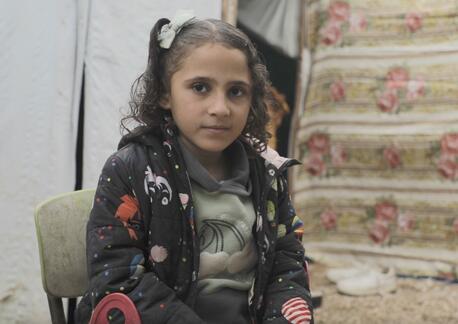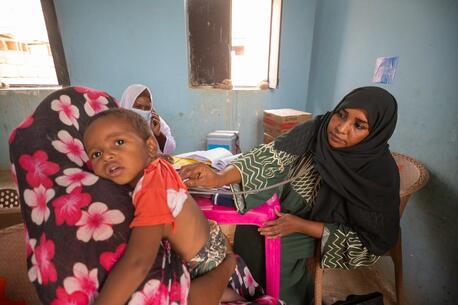
UNICEF Mobile Clinics a Lifeline for Displaced Families in Sudan
UNICEF mobile clinics staffed by community health workers bring critical health care and nutrition services closer to vulnerable displaced communities.
More than 10 million people have been forced out of their homes by ongoing conflict in Sudan
In Atbara, River Nile state, northeastern Sudan, UNICEF, in partnership with the Federal Ministry of Health, has set up mobile clinics to provide an integrated package of services, including malnutrition screening and treatment, lifesaving immunizations for children and pregnant women, reproductive health care and general consultations to the ever-increasing number of internally displaced persons (IDPs), along with host communities.
Mobile clinics work close to sites that host the internally displaced, operating out of existing spaces: schools, health bureaus, clinics that had previously been closed — even under the shade of trees.
Mobile clinics deliver urgently needed integrated services to children and families
In Alsakam Alshabi camp, located in Adama locality, a team of female community health workers sit in a small room, ready to serve the population. It is early in the morning, and parents and caregivers arrive to receive treatment for various illnesses. They bring along their children for assessment, vaccinations and treatment. These mobile clinics are their only link to health care services.
“Before the mobile clinics, we gave our children painkillers whenever they were ill,” says Safaa, a displaced mother waiting in line.
Iman, a doctor, says, “Many displaced families require urgent health services. These mobile clinics are a lifeline because they offer integrated services.”
Watch the video:
Why mobile clinics?
Initiated in 2024, the mobile clinics operate three times a week, bringing critical health care services closer to those who urgently need them.
Highlighting the importance of these clinics, UNICEF Nutrition Officer Khalid Ismail notes that this intervention addresses the sudden spike in diarrhea, malnutrition and acute respiratory infections among children within shelters for the displaced.
Currently, five mobile clinics in Adama, Atbara and Matama localities — areas with high displacement — are fully operational and equipped with health and nutrition supplies, thanks to UNICEF. This support also ensures that the frontline health workers are compensated for their work.
In Adama locality alone, the mobile clinic serves over 2,000 people, most of whom are from Khartoum; 17 percent are children under age 5.
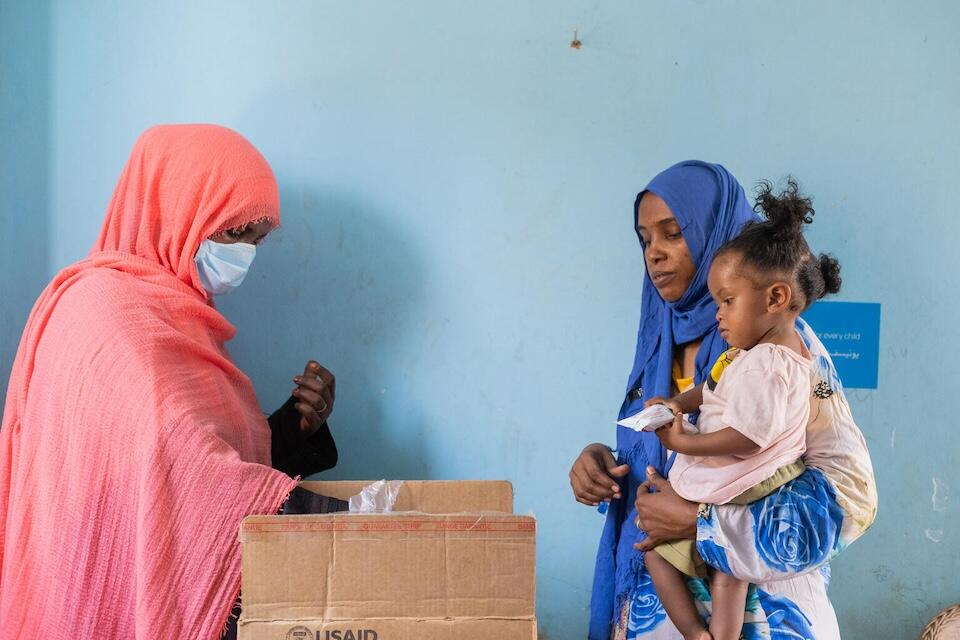
Malnutrition screenings and Ready-to-Use Therapeutic Food (RUTF)
Amal, a displaced mother from Khartoum, arrives for a follow-up visit for her 11-month-old daughter, Yadin, who is acutely malnourished. Three weeks ago, Yadin’s mid-upper arm circumference was only 11.3 centimeters; today, it reads 11.5 centimeters.
"When I brought my daughter, she was very sick. Her body was weak, and her eyes looked tired,” Amal shares. “But since she started taking the supplement, she has begun eating well.”
Enrolled in the nutrition program and provided with Ready-to-Use Therapeutic Food (RUTF), Yadin has gained some weight and is steadily recovering. The good news is she likes the nutritious peanut paste that supports her recovery. At the end of the visit, Amal receives more sachets of RUTF that will last until the next appointment.
The faces behind the mobile clinic in Adama
As part of its emergency response, UNICEF is investing in the hiring of community health workers to sustain the delivery of health care services.
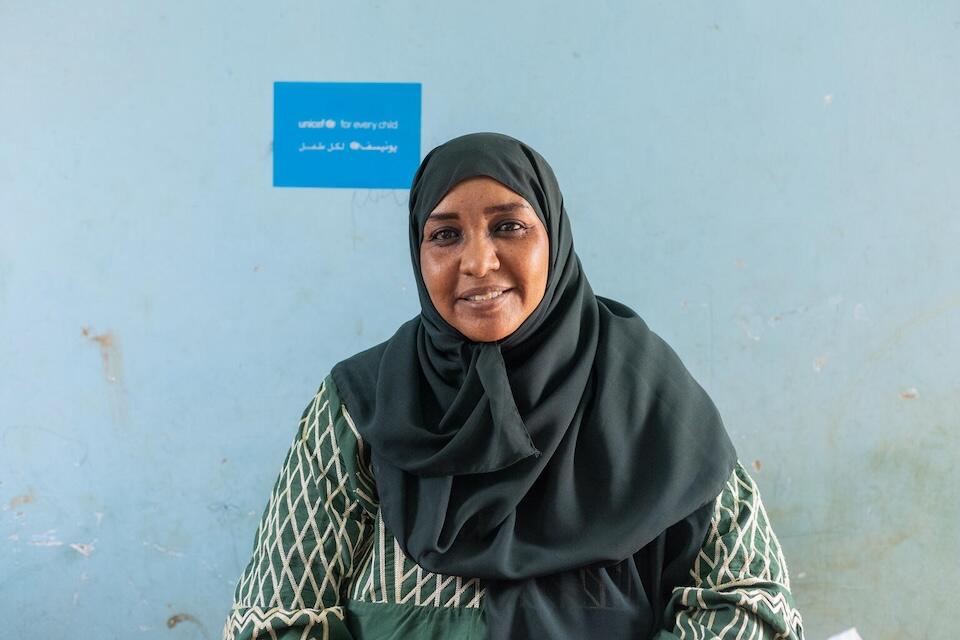
Iman, a doctor, handles all consultations. Since the onset of the conflict, she has witnessed firsthand the rising numbers of displaced families and their urgent need for health care services. “This is why I am here: to provide them with the medical care they need,” she says.
With a stethoscope in hand, she examines both young and old and confirms that diarrhea and respiratory infections are the major illnesses among children under 5. Through mobile clinics, quick and timely referrals for children in critical conditions are made.
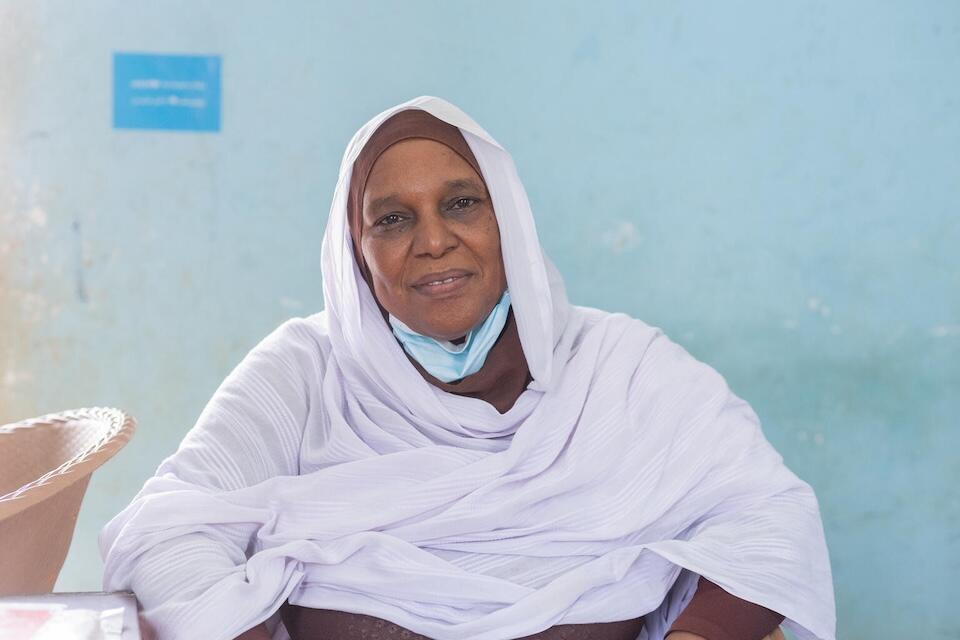
Eshan, an assistant nutritionist, has set up her station complete with nutrition supplies and a color-coded tape. Using this simple but effective tool, she screens all children for malnutrition and provides immediate treatment for those who are sick.
She has observed a spike in moderate acute malnutrition, with many mothers attributing it to insufficient food. “They lack money to purchase the optimal foods needed for their children to grow,” she says. With the nutrition supplies readily available, Eshan can provide lifesaving care for many children affected by malnutrition.
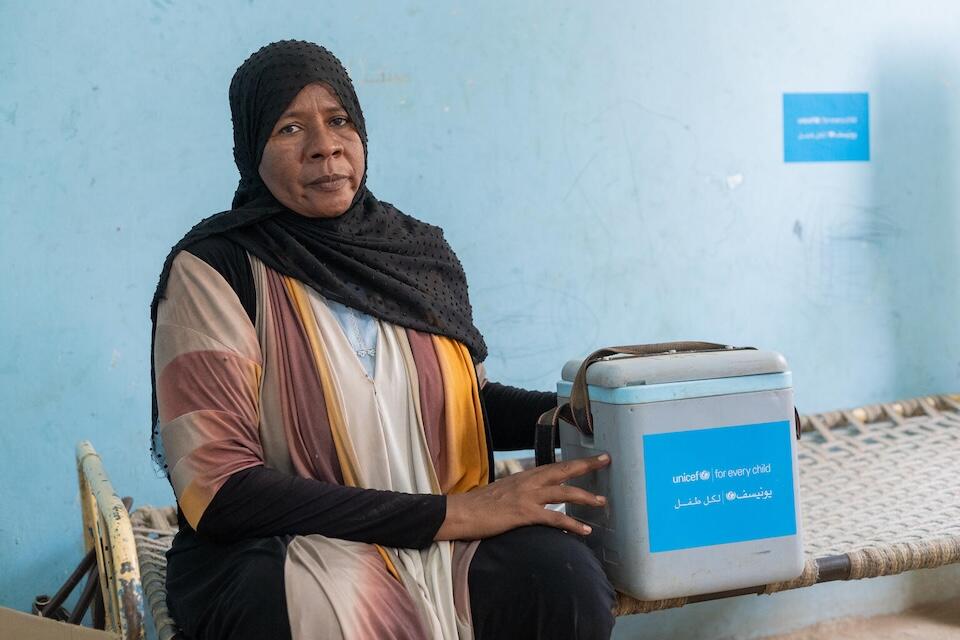
Dedicated, resilient community health workers go the extra mile for children
Afaf has been a vaccinator for decades. In addition to working with the mobile clinic, she also conducts house-to-house immunization drives to reach children in remote areas of Atbara.
At the clinic today, she sits next to a carrier packed with vaccines for inoculating children under 2. She carefully checks the vaccination cards of all children visiting the clinic to ensure their vaccinations are up to date, reminding parents of the next appointments. She is happy that despite the war, they have access to all vaccines, which makes her job much easier.
What keeps her going every day? “I want all the children to be vaccinated, and I want to be able to bring the vaccinations to their doorsteps, so no child is missed,” she says.
Community health workers like Iman, Eshan and Afaf are the heartbeat of health care service delivery at the grassroots level during the ongoing conflict, reaching vulnerable populations and saving lives. Their resilience and dedication to serving displaced and host communities is unmatched.
UNICEF is providing urgent assistance to Sudan's children. Your contribution will make a difference. Please donate today.
Learn more about how UNICEF is helping Sudan's children.
This story first appeared on unicef.org
HOW TO HELP
There are many ways to make a difference
War, famine, poverty, natural disasters — threats to the world's children keep coming. But UNICEF won't stop working to keep children healthy and safe.
UNICEF works in over 190 countries and territories — more places than any other children's organization. UNICEF has the world's largest humanitarian warehouse and, when disaster strikes, can get supplies almost anywhere within 72 hours. Constantly innovating, always advocating for a better world for children, UNICEF works to ensure that every child can grow up healthy, educated, protected and respected.
Would you like to help give all children the opportunity to reach their full potential? There are many ways to get involved.





